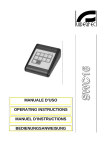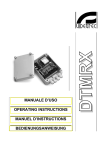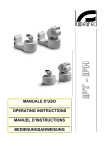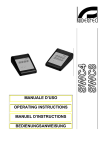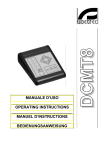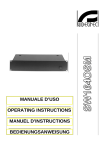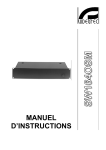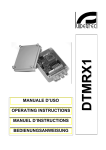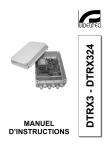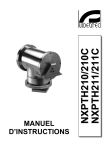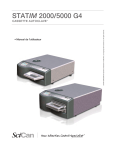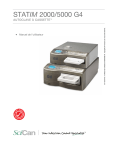Download manuale d'uso - webclienti.it
Transcript
MANUALE D’USO ____________________________ OPERATING INSTRUCTIONS ____________________________ MANUEL D’INSTRUCTIONS ____________________________ BEDIENUNGSANWEISUNG MANUALE D’USO INDICE INDICE.................................................................................................................................................................................... 1 INTRODUZIONE .................................................................................................................................................................... 2 Contenuto dell’imballo ............................................................................................................................................................................... 2 Cosa contiene questo manuale................................................................................................................................................................. 2 Convenzioni tipografiche ........................................................................................................................................................................... 2 NORME DI SICUREZZA ........................................................................................................................................................ 2 DATI DI MARCATURA........................................................................................................................................................... 3 DESCRIZIONE DEL CONTROLLORE DI COMUNICAZIONI SERIALI DCMX .................................................................... 3 Caratteristiche ........................................................................................................................................................................................... 3 Apparecchi compatibili per l’uso con il controllore di comunicazioni seriali DCMX ................................................................................... 3 Esempio di installazione............................................................................................................................................................................ 4 Cavi ........................................................................................................................................................................................................... 4 INSTALLAZIONE ................................................................................................................................................................... 5 Apertura dell’imballaggio ........................................................................................................................................................................... 5 Controllo della marcatura .......................................................................................................................................................................... 5 CONFIGURAZIONE DEL CONTROLLORE DI COMUNICAZIONI SERIALI DCMX ............................................................ 6 Jumpers di configurazione ........................................................................................................................................................................ 6 Configurazione dell’Ingresso n.1 ........................................................................................................................................................... 7 Configurazione dell’Ingresso n.2 ........................................................................................................................................................... 7 Configurazione dell’Ingresso n.3 ........................................................................................................................................................... 7 Configurazione dell’Ingresso n.4 ........................................................................................................................................................... 7 Baud rate TRASMISSIONE ................................................................................................................................................................... 7 Baud rate RICEZIONE .......................................................................................................................................................................... 7 CONNETTORI E COLLEGAMENTI ...................................................................................................................................... 8 ACCENSIONE E SPEGNIMENTO....................................................................................................................................... 10 MANUTENZIONE................................................................................................................................................................. 10 RISOLUZIONE DI PROBLEMI ............................................................................................................................................ 10 CARATTERISTICHE TECNICHE ........................................................................................................................................ 10 Il produttore declina ogni responsabilità per eventuali danni derivanti da un uso improprio delle apparecchiature menzionate in questo manuale; si riserva inoltre il diritto di modificarne il contenuto senza preavviso. Ogni cura é stata posta nella raccolta e nella verifica della documentazione contenuta in questo manuale: tuttavia il produttore non può assumersi alcuna responsabilità derivante dall’utilizzo della stessa. Lo stesso dicasi per ogni persona o società coinvolta nella creazione e nella produzione di questo manuale. Pag. 1 DCMX9828 Introduzione Contenuto dell’imballo • 1 controllore di comunicazioni seriali DCMX • 8 cavi telefonici 6/6 dritto dritto - Lunghezza ca.150 cm. • 8 scatole di derivazione RJ jack • 1 manuale d’uso Alla consegna del prodotto verificare che l’imballo sia integro e non abbia segni evidenti di cadute o abrasioni. In caso di evidenti segni di danno all’imballo contattare immediatamente il fornitore. Controllare che il contenuto sia rispondente alla lista del materiale sopra indicata. Cosa contiene questo manuale In questo manuale è descritto il controllore di comunicazioni seriali DCMX, con le particolari procedure di installazione, configurazione e utilizzo. È necessario leggere attentamente questo manuale, in particolar modo il capitolo concernente le norme di sicurezza, prima di installare ed utilizzare il controllore di comunicazioni seriali. Convenzioni tipografiche Nel presente manuale si fa uso di diversi simboli grafici, il cui significato è riassunto di seguito: Rischio di scariche elettriche; togliere l’alimentazione prima di procedere con le operazioni, se non é espressamente indicato il contrario. L’operazione é molto importante per il corretto funzionamento del sistema: si prega di leggere attentamente la procedura indicata, ed eseguirla secondo le modalità previste. Descrizione delle caratteristiche del sistema: si consiglia di leggere attentamente per comprendere le fasi successive. Norme di sicurezza Il controllore di comunicazioni seriali DCMX é conforme alle normative vigenti all’atto della pubblicazione del presente manuale per quanto concerne la sicurezza elettrica, la compatibilità elettromagnetica ed i requisiti generali. Si desidera tuttavia garantire gli utilizzatori (tecnico installatore e operatore) specificando alcune avvertenze per operare nella massima sicurezza: • Collegare ad una linea di alimentazione corrispondente a quella indicata sulle etichette di marcatura (vedere il successivo capitolo Dati di marcatura) • La presa di alimentazione deve essere connessa a terra secondo le norme vigenti • Prima di spostare o effettuare interventi tecnici sull’apparecchio, disinserire la spina di alimentazione • Non utilizzare cavi di tensione con segni di usura o invecchiamento, in quanto rappresentano un grave pericolo per l’incolumità degli utilizzatori • L’installazione dell’apparecchio (e dell’intero impianto di cui esso fa parte) deve essere effettuata da personale tecnico adeguatamente qualificato • L’apparecchio deve essere aperto soltanto da personale tecnico qualificato. La manomissione dell’apparecchio fa decadere i termini di garanzia • Non utilizzare l’apparecchio in presenza di sostanze infiammabili • Non permettere l’uso dell’apparecchio a bambini o incapaci • Accertarsi che l’apparecchio sia fissato in maniera solida e affidabile • L’apparecchio si considera disattivato soltanto quando l’alimentazione é disinserita e i cavi di collegamento con altri dispositivi sono stati rimossi • Per l’assistenza tecnica rivolgersi esclusivamente al personale tecnico autorizzato • Conservare con cura il presente manuale per ogni futura consultazione Pag. 2 DCMX9828 Dati di marcatura Sul controllore di comunicazioni seriali DCMX sono riportate due etichette conformi alla marcatura CE. La prima etichetta contiene: • Codice di identificazione del modello (Codice a barre Extended 3/9 ) • Tensione di alimentazione (Volt) • Frequenza (Hertz) • Consumo (Watt) La seconda etichetta indica il numero di serie del modello (codice a barre Extended 3/9) All’atto dell’installazione controllare se le caratteristiche di alimentazione del controllore di comunicazioni seriali corrispondono a quelle richieste. L’uso di apparecchi non idonei può portare a gravi pericoli per la sicurezza del personale e dell’impianto. Descrizione del controllore di comunicazioni seriali DCMX L’unità DCMX è un controllore di comunicazione che restituisce i dati in ingresso su 8 uscite, permettendo configurazioni a stella delle linee dati. • Il DCMX permette il controllo contemporaneo del sistema di telemetria da parte di 4 operatori (4 ingressi / 8 uscite). Caratteristiche • • • • • • 4 Ingressi seriali Ingressi seriali selezionabili tra RS-232 e Current Loop 8 uscite seriali per la restituzione dei dati ricevuti dagli ingressi Trasmissione contemporanea in Current Loop e RS-232 sulle 8 uscite Possibilità di collegamento in cascata con altre unità DCMX Velocità di comunicazione variabile (Baudrate: 9600 Baud/1200 Baud) Apparecchi compatibili per l’uso con il controllore di comunicazioni seriali DCMX • DCS2, DCMT8: tastiere di controllo. • Ricevitore di comandi DTRX: ricevitore digitale a 17 funzioni, consente il controllo a distanza di un brandeggio motorizzato, di lavavetri e pompa, e di 4 contatti ausiliari. È indirizzabile singolarmente fino a 99 unità. Se dotato di scheda opzionale DTRP permette la gestione di max 14 posizioni di preset, richiamabili in ciclata con la funzione patrol. • Miniricevitore di comandi DTMRX: ricevitore digitale a 11 funzioni, consente il controllo di base di un brandeggio motorizzato (orizzontale e verticale, ottiche, autopan). Indirizzabile singolarmente fino a 64 unità. • Miniricevitore di comandi MICRODEC: ricevitore digitale a 8 funzioni (orizzontale, verticale, zoom e focus). Indirizzabile fino a 32 unità. Pag. 3 DCMX9828 Esempio di installazione Tre operatori con un monitor ciascuno, con controllo di un gruppo di ricevitori da parte di due di loro; il terzo effettua soltanto operazioni di commutazione video PTH PTH DTMRX PTH DTMRX DTMRX SW164OSM SW16.4 DCMX DCMX DCS2 DCS2 P RE SET C OM FAU LT DCS2 DCS2 P RES ET SC A N AUX 1 AU X 2 AU X 3 AUX 4 C OM FA U LT M /A A LAR M 2 3 4 5 6 7 8 9 0 A UX 1 AU X 2 AUX 4 C OM FAU LT M /A A LAR M PR OG WIPER C LEA R E NTER AU X 3 PR OG WIPER 1 KEYPLUS KEYPLUS SC A N M /A A LAR M PR OG -/ - - MATERIALE Parte di controllo: 2 tastiere di controllo DCS2 1 tastiera di controllo KEYPLUS Parte video: 3 monitor 3 telecamere Parte telemetria: 3 ricevitori DTMRX 3 brandeggi 1 multiplexer digitale DCMX IN U SER OU T OP EN CLOSE N EA R FAR -/-- 1 2 3 4 5 6 7 8 9 0 IN C LEA R EN TER U SER OUT OP EN CLOSE N EA R FAR -/-- 1 2 3 4 5 6 7 8 9 0 C LEA R E NTE R Cavi Nello schema d’esempio sono stati utilizzati diversi tipi di tratto per indicare cavi di diversa funzione: cavo video: coassiale RG 59 o cavo equivalente. cavo multipolare: ogni funzione di controllo del brandeggio viene attivata / disattivata da un relè interno al ricevitore. Stabilire il numero finale di cavi, seguendo le indicazioni seguenti: 7 fili per la movimentazione del brandeggio: destra, sinistra, alto, basso, autopan, comune, terra 6 fili di controllo per ottiche ad inversione di polarità (zoom, focus, iris) 4 fili di controllo per ottiche a filo comune (zoom, focus, iris) 2 fili per l’ ausiliare Nota: è consigliato l’utilizzo di differenti cavi multipolari per le funzioni in bassa tensione ed in alta tensione. Sezione minima consigliata: 0,56 mm.² (AWG 20) per fili in alta tensione (brandeggio) 0,34 mm.² (AWG 22) per fili in bassa tensione (ottica, ausiliare) cavo per la ricezione/trasmissione digitale dei comandi: 2 fili per la ricezione dall’unità di comando (doppino telefonico twistato, sezione 0,22 mm.² AWG 24) 2 fili per la eventuale trasmissione al ricevitore successivo nelle configurazione in cascata (doppino telefonico twistato, sezione 0,22 mm.² AWG 24) Nota: la distanza massima del collegamento é di circa 15 m in RS232; 1500 m in Current Loop. Pag. 4 DCMX9828 Installazione La fase di installazione deve essere effettuata solo da personale tecnico qualificato. Le seguenti procedure sono da effettuare in assenza di alimentazione, se non diversamente indicato. Apertura dell’imballaggio Se l’imballo non presenta evidenti difetti (dovuti a cadute o abrasioni anomale), procedere al controllo del materiale in esso contenuto, secondo la lista fornita al paragrafo Contenuto dell’imballo al capitolo Introduzione. I materiali d’imballo sono costituiti interamente da materiale riciclabile. Sarà cura del tecnico installatore smaltirli secondo le modalità di raccolta differenziata o comunque secondo le norme vigenti nel Paese di utilizzo. Controllo della marcatura Prima di procedere con l’installazione controllare se il materiale fornito corrisponde alle specifiche richieste, esaminando le etichette di marcatura, secondo quanto descritto al capitolo Descrizione della marcatura. Non effettuare per nessun motivo alterazioni o collegamenti non previsti in questo manuale: l’uso di apparecchi non idonei può portare a gravi pericoli per la sicurezza del personale e dell’impianto. Pag. 5 DCMX9828 Configurazione del controllore di comunicazioni seriali DCMX La fase di configurazione del DCMX consente di predisporlo ad un funzionamento ottimale, in base alle necessità dell’impianto. La configurazione deve essere fatta solo al momento dell’installazione da parte del tecnico installatore. Si consiglia di procedere con ordine alla configurazione dei parametri, per evitare problemi di installazione. La configurazione consiste nell’impostare: 1) Modalità di ricezione di ciascun ingresso (RS232/Current Loop) 2) Baudrate della comunicazione Jumpers di configurazione Nello schema seguente identificare i jumpers di configurazione ed il DIP switch U6: Pag. 6 DCMX9828 Configurazione dell’Ingresso n.1 Dove agire : Jumper JP1 Impostazioni : • Modalità RS-232 : Impostare il Jumper in posizione R • Modalità Current Loop : Impostare il Jumper in posizione C Configurazione dell’Ingresso n.2 Dove agire : Jumper JP2 Impostazioni : • Modalità RS-232 : Impostare il Jumper in posizione R • Modalità Current Loop : Impostare il Jumper in posizione C Configurazione dell’Ingresso n.3 Dove agire : Jumper JP3 Impostazioni : • Modalità RS-232 : Impostare il Jumper in posizione R • Modalità Current Loop : Impostare il Jumper in posizione C Configurazione dell’Ingresso n.4 Dove agire : Jumper JP4 Impostazioni : • Modalità RS-232 : Impostare il Jumper in posizione R • Modalità Current Loop : Impostare il Jumper in posizione C Baud rate TRASMISSIONE Dove agire : DIP switch U6, interruttore 1 Impostazioni : 9600 baud 1200 baud Baud rate RICEZIONE Dove agire : DIP switch U6, interruttore 2 Impostazioni : 9600 baud 1200 baud Gli interruttori 3 e 4 sono usati per i test dell’apparecchio e non devono mai essere modificati: DIP 3 sempre OFF DIP 4 OFF: DCMX Pag. 7 DCMX9828 Connettori e collegamenti L’unità DCMX presenta 12 connettori RJ11 posti sul retro della meccanica ed un fusibile di protezione: Alimentazione Uscite seriali 1 2 3 4 5 Ingressi seriali 6 7 8 1 2 3 4 63 mA 250V T La trasmissione dei dati digitali dalle uscite è effettuata contemporaneamente in RS232 e in Current Loop. La modalità di ricezione dei segnali in ingresso è selezionabile in fase di configurazione del controllore DCMX. Verificare che i jumper di selezione deiricevitori DTMRX/DTRX/MICRODEC siano disposti correttamente, facendo riferimento al relativo manuale di configurazione. La tastiera DCS2/DCMT8, il controllore DCMX ed i ricevitori DTMRX/DTRX/MICRODEC possono essere collegati direttamente tramite cavo telefonico fornito dal fabbricante, per la verifica in laboratorio del funzionamento delle apparecchiature: DTRX DTRX DCMX DCMT8 DCS2 Pag. 8 DCMX9828 Per il collegamento con il cavo twistato, collegare gli apparecchi tramite le scatole di derivazione RJ, fornite dal fabbricante, secondo le tabelle di riferimento riportate di seguito: Collegamento tastiere DCS2/DCMT8 - controllore DCMX DCMX Collegamento Current Loop: max 1500 m DCS2/DCMT8 DCMX TX CL Giallo ------------- Nero RX CL GND CL Rosso --------------Verde GND CL Collegamento RS232: distanza max 15 metri DCS2/DCMT8 DCMX TX RS232 Nero -------- Giallo RX RS232 GND RS232 Verde -------- Rosso GND RS232 DCMT8 Collegamento controllore DCMX- ricevitore DTMRXDTRX/MICRODEC DTMRX Collegamento Current Loop: max 1500 m DCMX DTMRX/DTRX/MICRODEC GND CL Rosso -------------- Verde GND CL TX CL Giallo ---------------Nero RX CL Collegamento RS232: distanza max 15 metri DCMX DTMRX/DTRX/MICRODEC GND RS232 Verde -------- Rosso GND RS232 TX RS232 Nero------------Giallo RX RS232 DCMX Pag. 9 DCMX9828 Accensione e spegnimento Prima di fornire alimentazione: • controllare se il materiale fornito corrisponde alle specifiche richieste, esaminando le etichette di marcatura, secondo quanto descritto al capitolo Descrizione della marcatura. • controllare che il fusibile di protezione del controllore di comunicazioni seriali DCMX sia integro • controllare che il controllore di comunicazioni seriali DCMX e gli altri componenti dell’impianto siano chiusi e sia quindi impossibile il contatto diretto con parti in tensione. • accertarsi che tutte le parti siano fissate in maniera solida ed affidabile • controllare che le fonti di alimentazione ed i cavi di collegamento siano in grado di sopportare il consumo del sistema Manutenzione Il controllore di comunicazioni seriali DCMX non necessita di particolare manutenzione. Si raccomanda di utilizzarlo poggiato su una base solida, con i cavi di alimentazione e di collegamento in posizione tale da non essere causa di intralcio all’operatore. Risoluzione di problemi Il controllore di comunicazioni seriali DCMX è caratterizzato da una notevole facilità d’uso, ma ciononostante possono insorgere dei problemi sia in fase di installazione, di configurazione o durante l’uso. Problema Non funziona Dopo l’accensione le tastiere DCS2/DCMT8 collegate non funzionano I ricevitori DTMRX/DTRXMICRODEC non rispondono ai comandi Possibile causa Manca alimentazione Fusibile bruciato Configurazione errata della modalità di trasmissione Collegamento non corretto Il cavo telefonico è collegato sul connettore sbagliato della tastiera DCS2/DCMT8 Collegamento non corretto Il numero di identificazione del ricevitore non è corretto Il cavo telefonico è collegato sul connettore sbagliato della tastiera DCS2/DCMT8 Intervento correttivo Controllare il cavo di alimentazione Sostituire il fusibile • Controllare i jumpers JP1,JP2,JP3,JP4 • Controllare il settaggio delle tastiere DCS2/DCMT8 Controllare i cavi di collegamento Controllare che il cavo telefonico sia inserito nel connettore corretto Controllare i cavi di collegamento Controllare il numero di identificazione del ricevitore (fare riferimento ai manuali DTMRX/DTRX/MICRODEC Controllare che il cavo telefonico sia inserito nel connettore corretto Caratteristiche tecniche Tensione: Potenza: Fusibile di protezione: Temperatura di funzionamento: Dimensioni: Peso: 230 V~, 50/60 Hz (riferirsi ai dati di marcatura) 10 W 63 mA 250V T da 0°C a 40°C 220 x 40 x 180 mm 1.750 g Pag. 10 DCMX9828 OPERATING INSTRUCTIONS INDEX INDEX..................................................................................................................................................................................... 1 INTRODUCTION .................................................................................................................................................................... 2 Packing contents ....................................................................................................................................................................................... 2 Contents of this Manual............................................................................................................................................................................. 2 Typographic conventions........................................................................................................................................................................... 2 SAFETY RULES .................................................................................................................................................................... 2 IDENTIFICATION DATA ........................................................................................................................................................ 3 DESCRIPTION OF THE SERIAL COMMUNICATION CONTROLLER DCMX .................................................................... 3 Features .................................................................................................................................................................................................... 3 Appliances compatible for use with the serial communication controller DCMX ....................................................................................... 3 Installation example................................................................................................................................................................................... 4 Cables ....................................................................................................................................................................................................... 4 INSTALLATION ..................................................................................................................................................................... 5 Unpacking ................................................................................................................................................................................................. 5 Check of identification data ....................................................................................................................................................................... 5 CONFIGURATION OF THE SERIAL COMMUNICATION CONTROLLER DCMX .............................................................. 6 Configuration jumpers ............................................................................................................................................................................... 6 Input n. 1 configuration.......................................................................................................................................................................... 7 Input n.2 configuration........................................................................................................................................................................... 7 Input n.3 configuration........................................................................................................................................................................... 7 Input n.4 configuration........................................................................................................................................................................... 7 Baud rate TRANSMISSION................................................................................................................................................................... 7 Baud rate RECEPTION ......................................................................................................................................................................... 7 CONNECTORS AND CONNECTIONS.................................................................................................................................. 8 SWITCHING ON AND OFF.................................................................................................................................................. 10 MAINTENANCE ................................................................................................................................................................... 10 PROBLEM SOLUTION ........................................................................................................................................................ 10 SPECIFICATIONS................................................................................................................................................................ 10 The manufacturer declines all responsibility for any damage caused by an improper use of the appliances mentioned in this manual; furthermore, the manufacturer reserves the right to modify its contents without any prior notice. The documentation contained in this manual has been collected with great care: the manufacturer, however, cannot take any liability for its use. The same thing can be said for any person or company involved in the creation and production of this manual. Pag. 1 DCMX9828 Introduction Packing contents • 1 serial communication controller DCMX • 8 RJ11 cables • 8 junction boxes • 1 instruction manual After the delivery, check that the packing is not damaged and shows no evident signs of falls or abrasion. Should this be so, contact immediately the supplier. Check that the contents correspond to the above-mentioned list of materials. Contents of this Manual This manual describes the serial communication controller DCMX together with its specific procedures of installation, configuration and use. Read this manual carefully, in particular the chapter concerning the safety rules, before installing and using the serial communication controller. Typographic conventions Different graphic symbols are used in this manual, the meaning of which is here described: Hazard of electric shock; disconnect the power supply before proceeding, if not otherwise specified. The operation is very important for the correct working of the system: read carefully the procedure indicated, and carry it out according to the required modalities. Description of system features: read carefully to understand the following phases. Safety rules The serial communication controller DCMX complies with the normative laws in force at the time of editing of this manual, concerning electric safety, electromagnetic compatibility and general requirements. Anyway, in order to ensure the users (installer technician and operator), the following warnings are specified for safety’s sake: • Connect to a feeder corresponding to the specifications indicated on the data plate (see next chapter Identification data) • The outlet must be correctly earthed according to the normative laws in force • Before any shifting or technical operations on the appliance, unplug it from the mains • Do not use voltage cables showing wear or ageing, since they may seriously compromise the users’ safety • The appliance (and the complete system, which it belongs to) must be installed only by qualified technical staff • The appliance must be opened only by qualified technical staff. The tampering of the appliance may void the guarantee terms. • Do not use the appliance in the presence of inflammable substances • Do not allow children or people not familiar with the appliance to use it • Make sure the appliance is fixed in a solid and reliable way • The appliance is completely off-line only when the plug is diconnected and the cables connected to other appliances have been removed • For after-sale service call only authorised technical staff. • Keep this manual close to hand for any future reference Pag. 2 DCMX9828 Identification data On the serial communication controller DCMX there are two plates complying with EC specifications. The first plate includes: • Model identification code (Extended bar code 3/9 ) • Mains voltage (Volt) • Frequency (Hertz) • Power consumption (Watt) The second plate shows the model serial number (Extended bar code 3/9) When installing the appliance, check that the power supply specifications of the serial communication controller correspond to those required. The use of improper appliances may seriously compromise the safety of the personnel and the installation. Description of the serial communication controller DCMX The DCMX unit is a serial communication controller which can send the input data back to 8 outputs, allowing in this way star configurations. • DCMX allows the simultaneous control of the range finding system by 4 operators (4 inputs / 8 outputs). Features • • • • • • 4 Serial inputs Serial inputs selectable between RS-232 an Current Loop 8 serial outputs for the data sending back from the inputs Simultaneous transmission in Current Loop and RS-232 on all 8 outputs Possibility of cascade connection to other DCMX units Variable communication speed (Baudrate: 9600 Baud/1200 Baud) Appliances compatible for use with the serial communication controller DCMX • DCS2, DCMT8: keyboards. • Receiver driver DTRX: 17-function digital receiver, allowing the remote control of pan & tilt motors, wiper and wash, and 4 auxiliary contacts. It can be individually addressed up to 99 units. If provided with the optional card DTRP, it allows the management of max. 14 preset positions, which are recalled in the switching cycle by the patrol function. • Mini receiver driver DTMRX: 11-function digital receiver, allowing the control of pan & tilt motors (horizontal and vertical, zoom lenses, autopan). It can be individually addressed up to 64 units. • Mini receiver driver MICRODEC: 8-function digital receiver (horizontal, vertical, zoom and focus). It can be adressed up to 32 units. Pag. 3 DCMX9828 Installation example Three operators with one monitor each, two of them controlling a group of receivers, the third carrying out only video switching operations PTH PTH DTMRX PTH DTMRX DTMRX SW164OSM SW16.4 DCMX DCMX DCS2 DCS2 DCS2 DCS2 P RE SET C OM FAU LT P RES ET SC A N AUX 1 AU X 2 AU X 3 AUX 4 C OM FA U LT M /A A LAR M 2 3 4 5 6 7 8 9 0 A UX 1 AU X 2 AUX 4 C OM FAU LT M /A A LAR M PR OG WIPER C LEA R E NTER AU X 3 PR OG WIPER 1 KEYPLUS KEYPLUS SC A N M /A A LAR M PR OG -/ - - MATERIAL Control part: 2 keyboards DCS2 1 keyboard KEYPLUS Video part: 3 monitors 3 telecameras Telemetry part: 3 receivers DTMRX 3 pan & tilt motors 1 digital multiplexer DCMX IN U SER OU T OP EN CLOSE N EA R FAR -/-- 1 2 3 4 5 6 7 8 9 0 IN C LEA R EN TER U SER OUT OP EN N EA R CLOSE FAR -/-- 1 2 3 4 5 6 7 8 9 0 C LEA R E NTE R Cables In the above scheme, different lines have been used to show different types of functions: video cable: coaxial RG 59 or equivalent cable. multipolar cable: each pan & tilt function is enabled / desabled by a relay inside the receiver. Define the cable final number, following these indications: 7 wires for pan & tilt movement: right, left, high, low, autopan, common, ground 6 control wires for reverse polarity zoom lenses (zoom, focus, iris) 4 control wires for common ground zoom lenses (zoom, focus, iris) 2 wires for the auxiliary Note: it is advisable to use different multipolar cables for low tension and high tension functions. Minimum section advised: 0,56 mm.² (AWG 20) for high tension wires (pan & tilt) 0,34 mm.² (AWG 22) for low tension wires (zoom lens, auxiliary) cable for control digital reception/transmission: 2 wires for the control unit reception (twisted pair cable, section 0,22 mm.² AWG 24) 2 wires for possible transmission to the following receiver in cascade configurations (twisted pair cable, section 0,22 mm.² AWG 24) Note: the maximum connection distance is about 15 m in RS232; 1500 m in Current Loop. Pag. 4 DCMX9828 Installation The installation must be carried out only by qualified technical staff. The following procedures must be carried out with power supply off, if not otherwise specified. Unpacking If the packing shows no relevant defects (due to falls or anomalous abrasions), check the material contained, according to the list given at paragraph Packing contents chapter Introduction. The packing materials can be completely recycled. The installer technician is required to dispose of them according to the differentiated collecting modalities or ,anyway, according to the normative laws in force in the Country of use. Check of identification data Before installing the appliance, check that the material supplied corresponds to the specifications indicated on the data plate, following the chapter Identification data. Do not carry out any modification or connections which are not provided for in this manual: the use of improper appliances may seriously compromise the safety of the personnel and the installation. Pag. 5 DCMX9828 Configuration of the serial communication controller DCMX The configuration phase predispose the DCMX to optimal running, according to system requirements. The configuration must be carried out only at the installation by the installer technician. Proceed in an orderly manner with the parameter configuration, so as to avoid installation problems. The configuration consists in selecting: 1) Receiving mode (RS-232 or Current Loop) for each input. 2) Communication Baudrate. Configuration jumpers In the following scheme, identify the configuration jumpers and the DIP switch U6: Pag. 6 DCMX9828 Input n. 1 configuration Where to operate : Jumper JP1 Settings : • RS-232 mode : Set the jumper to R position • Current Loop mode : Set the jumper to C position Input n.2 configuration Where to operate: Jumper JP2 Settings : • RS-232 mode : Set the jumper to R position • Current Loop mode : Set the jumper to C position Input n.3 configuration Where to operate: Jumper JP3 Settings : • RS-232 mode : Set the jumper to R position • Current Loop mode : Set the jumper to C position Input n.4 configuration Where to operate: Jumper JP4 Settings : • RS-232 mode : Set the jumper to R position • Current Loop mode : Set the jumper to C position Baud rate TRANSMISSION Where to operate: DIP switch U6, switch 1 Selections: 9600 baud 1200 baud Baud rate RECEPTION Where to operate: DIP switch U6, switch 2 Selections: 9600 baud 1200 baud The switches 3 and 4 are used for the appliance control and must not be changed: DIP 3 always OFF DIP 4 OFF Pag. 7 DCMX9828 Connectors and connections The DCMX unit features 12 RJ11 connectors located at the rear of the mechanics and one protection fuse: Power supply Serial inputs Serial outputs 1 2 3 4 5 6 7 8 1 2 3 4 63 mA 250V T The transmission of digital data from the outputs takes place simultaneously in RS232 and in Current Loop. The receiving mode of input signals is selectable during the configuration of the DCMX controller. Check that the selection jumpers of the DTMRX/DTRX/MICRODEC receivers are correctly placed, referring to the relative configuration manual. The DCS2/DCMT8 keyboard, the DCMX controller and the DTMRX/DTRX/MICRODEC receivers can be connected together by telephone cable supplied by the manufacturer, for a laboratory check of the appliance running: DTRX DTRX DCMX DCMT8 DCS2 Pag. 8 DCMX9828 For the connection by twisted cable, connect the appliances by means of RJ connector blocks, supplied by the manufacturer, following these reference tables: Connection of DCS2/DCMT8 keyboards - DCMX controller DCMX Current Loop connection: max distance 1500 m DCS2/DCMT8 DCMX TX CL Yellow ------------- Black RX CL GND CL Red -----------------Green GND CL RS232 connection: max distance 15 metres DCS2/DCMT8 DCMX TX RS232 Black -------- Yellow RX RS232 GND RS232 Green -------- Red GND RS232 DCMT8 Connection of DCMX controller - DTMRX/DTRX/MICRODEC receiver DTMRX Current Loop connection: max distance 1500 m DCMX DTMRX/DTRXMICRODEC GND CL Red -------------- Green GND CL TX CL Yellow ------------Black RX CL RS232 connection: max distance 15 metres DCMX DTMRX/DTRXMICRODEC GND RS232 Green -------- Red GND RS232 TX RS232 Black ----------Yellow RX RS232 DCMX Pag. 9 DCMX9828 Switching on and off Before connecting the appliance: • check that the material supplied corresponds to the specifications indicated on the data plate, following the chapter Identification data • check if the protection fuse of the serial communication controller DCMX is in a good condition • check that the serial communication controller DCMX and the other components of the installation are closed in order to avoid direct contact with energized parts. • make sure that all the parts are fixed in a solid and reliable way • check that the electrical capacity and the connection cables will support the system power consumption Maintenance The serial communication controller DCMX does not need a special maintenance. Make sure it always rests on a solid base, and that the power supply and connection cables do not hinder the operator. Problem solution Even if the serial communication controller DCMX is very easy to use, some problems may arise during installation, configuration or use. Problem It does not run After the switching on, the connected keyboards DCS2/DCMT8 do not run The DTMRX/DTRX/MICRODEC receivers do not respond to the controls Possible cause Power supply not connected The fuse is blown Improper configuration of the transmission mode Incorrect connection The telephone cable is connected to the wrong connector of the DCS2/DCMT8 keyboard Incorrect connection The receiver identification number is wrong The telephone cable is connected to the wrong connector of the DCS2/DCMT8 keyboard Remedy Check the power supply cable Replace the fuse • Check the jumpers JP1,JP2,JP3,JP4 • Check the setting of DCS2/DCMT8 keyboards Check the connection cables Check that the telephone cable is cut in the right connector Check the connection cables Check the receiver identification number (refer to DTMRX/DTRXMICRODEC manuals) Check that the telephone cable is cut in the right connector Specifications Power supply : Power consumption : Protection fuses: Operative temperature : Dimensions: Weight: 230 V~, 50/60 Hz (refer to identification data) 10 W 63 mA 250V T from 0°C to 40°C 220 x 40 x 180 mm 1.750 g Pag. 10 DCMX9828 MANUEL D’INSTRUCTIONS INDEX INDEX..................................................................................................................................................................................... 1 INTRODUCTION .................................................................................................................................................................... 2 Contenu de l’emballage............................................................................................................................................................................. 2 Contenu de ce manuel .............................................................................................................................................................................. 2 Conventions typographiques ..................................................................................................................................................................... 2 NORMES DE SÉCURITÉ....................................................................................................................................................... 2 CARACTÉRISTIQUES TECHNIQUES .................................................................................................................................. 3 DESCRIPTION DU CONTRÔLEUR DE COMMUNICATIONS SÉRIELLES DCMX............................................................. 3 Caractéristiques ........................................................................................................................................................................................ 3 Appareils compatibles pour l’emploi avec le contrôleur de communications sérielles DCMX................................................................... 3 Exemple d’installation............................................................................................................................................................................ 4 Câblage ..................................................................................................................................................................................................... 4 INSTALLATION ..................................................................................................................................................................... 5 Déballage .................................................................................................................................................................................................. 5 Contrôle des caractéristiques techniques ................................................................................................................................................. 5 CONFIGURATION DU CONTRÔLEUR DE COMMUNICATIONS SÉRIELLES DCMX....................................................... 6 Pontets de configuration............................................................................................................................................................................ 6 Configuration de l’Entrée n.1 ................................................................................................................................................................. 7 Configuration de l’Entrée n.2 ................................................................................................................................................................. 7 Configuration de l’Entrée n.3 ................................................................................................................................................................. 7 Configuration de l’Entrée n.4 ................................................................................................................................................................. 7 Baud rate TRANSMISSION................................................................................................................................................................... 7 Baud rate RECEPTION ......................................................................................................................................................................... 7 CONNECTEURS ET RACCORDEMENTS............................................................................................................................ 8 ALLUMAGE ET COUPURE................................................................................................................................................. 10 ENTRETIEN ......................................................................................................................................................................... 10 RÉSOLUTION DES PROBLÈMES...................................................................................................................................... 10 DONNÉES TECHNIQUES ................................................................................................................................................... 10 Le producteur décline toute responsabilité pour les dommages éventuels dus à une utilisation non appropriée des appareils mentionnés dans ce manuel; on réserve en outre le droit d’en modifier le contenu sans préavis. La documentation contenue dans ce manuel a été rassemblée et vérifiée avec le plus grand soin: cependant, le producteur ne peut pas s’assumer aucune responsabilité dérivante de l’emploi de celle-là. La même chose vaut pour chaque personne ou société impliquées dans la création et la production de ce manuel. Pag. 1 DCMX9828 Introduction Contenu de l’emballage • 1 contrôleur de communications sérielles DCMX • 8 cavets RJ11 • 8 boîte d’assemblage • 1 manuel d’emploi Lors de la livraison du produit, vérifier si l’emballage est intègre et s’il n’a subi de signes évidents de chutes ou de choc. Si l’emballage présente des signes évidents de dommage, contacter immédiatement le transporteur. Vérifier que le contenu correspond à la liste du matériel indiqué ci-dessus. Contenu de ce manuel Dans ce manuel on décrit le contrôleur de communications sérielles DCMX, et les procédures particulières d’installation, configuration et emploi. Il est nécessaire de lire attentivement ce manuel, surtout le chapitre cencernant les normes de sécurité, avant d’installer et employer le contrôleur de communications sérielles. Conventions typographiques Dans ce manuel on emploie des symboles graphiques différents, dont le sens est résumé ci-dessous: Risque de décharge électrique; couper l’alimentation avant de procéder avec toute opération, si le contraire n’est pas expressément indiqué. L’opération est très importante pour le fonctionnement correct du système: lire attentivement la procédure indiquée, et l’exécuter suivant les modalités prévues. Description des caractéristiques du système: lire attentivement pour comprendre les phases suivantes. Normes de sécurité Le contrôleur de communications sérielles DCMX est conforme aux normes en vigueur au moment de la publication de ce manuel pour ce qui concerne la sécurité électrique, la compatibilité électromagnétique et les conditions requises generales. On désire toutefois garantir les utilisateurs (technicien installateur et opérateur) en précisant certaines instructions pour opérer en toute sécurité: • Raccorder à un feeder suivant les indications des plaques des caractéristiques techniques (voir le chapitre suivant Caractéristiques techniques) • La prise d’alimentation doit être raccordée à la terre conformément aux normes en vigueur. • Avant de déplacer ou effectuer des interventions techniques sur l’appareil, débrancher la prise d’alimentation. • Ne pas employer de câbles de tension avec signes d’usure ou vieillissement, parce qu’ils peuvent compromettre sérieusement la sécurité des utilisateurs. • L’installation de l’appareil (et du système complet dont il fait partie) doit être effectuée par une personne qualifiée du point de vue technique. • L’appareil doit être ouvert seulement par un personnel technique qualifié. L’altération de l’appareil fait déchoir les termes de garantie • Ne pas employer l’appareil en présence de substances inflammables • Ne pas laisser des enfants ou des personnes non qualifieés utiliser l’appareil • Vérifier si l’appareil est fixé de façon solide et fiable • L’appareil est désactivé seulement quand la prise d’alimentation est débranchée et les câbles de raccordement avec d’autres dispositifs ont été enlevés. • Pour le service après-vente s’adresser exclusivement à personnel technique autorisé. • Conserver soigneusement ce manuel pour toute consultation ultérieure Pag. 2 DCMX9828 Caractéristiques techniques Sur le contrôleur de communications sérielles DCMX il y a deux plaques conformes aux caractéristiques techniques CE. La première plaque contient: • Code d’identification du modèle (Code à barre EXT3/9 ) • Tension d’alimentation (Volt) • Fréquence (Hertz) • Max. consommation (Watt) La deuxième plaque indique le numéro de série du modèle (Code à barre EXT3/9) Lors de l’installation vérifier si les caractéristiques d’alimentation du contrôleur de communications sérielles correspondent aux caractéristiques requises. L’emploi d’appareils non appropriés peut compromettre sérieusement la sécurité du personnel et de l’installation. Description du contrôleur de communications sérielles DCMX L’ unité DCMX est un contrôleur de communitions qui redonne les données en entrée sur 8 sorties, permettant ainsi de réaliser des configurations des lignes des données à étoile. • Le DCMX permet le contrôle simultané du systeme de télémetrie par 4 opérateurs (4entrées / 8 sorties). Caractéristiques • • • • • • 4 entrées sérielles Entrées sérielles qui peuvent être sélectionnées entre RS-232 et Boucle de Courant 8 sorties sérielles pour le retour des données réçues par les entrées Transmission simultanée en Boucle de Courant et RS-232 sur 8 sorties Possibilité de raccordement en cascade à d’autres unités DCMX Vitesse de communication variable (Baudrate: 9600 Baud/1200 Baud) Appareils compatibles pour l’emploi avec le contrôleur de communications sérielles DCMX • DCS2, DCMT8: pupitres de contrôle. • Récepteur de commandes DTRX: récepteur numérique à 17 fonctions, il permet le contrôle à distance d’une tourelle motorisée, d’essuie-glace et pompe, et de 4 contacts auxiliaires. Individuellement adressable jusqu’à 99 unités. S’il est pourvu de carte optionnelle DTRP, il peut gerer 14 positions de preset au max. qui peuvent être rappelées en cycle de commutation par la fonction patrol. • Minirécepteur de commandes DTMRX: récepteur numérique à 11 fonctions, il permet le contrôle de base d’une tourelle motorisée (horizontale et verticale, objectif, autopan). Adressable individuellement jusqu’à 64 unités. • Minirécepteur de commandes MICRODEC: récepteur numérique à 8 fonctions (horizontale, verticale, zoom et focus). Adressable jusqu’à 32 unités. Pag. 3 DCMX9828 Exemple d’installation Trois opérateurs avec un moniteur chacun, deux d’entre eux contrôlent un groupe de récepteurs; le troisième effectue seulement des opérations de commutation vidéo PTH PTH DTMRX PTH DTMRX DTMRX SW164OSM SW16.4 DCMX DCMX DCS2 DCS2 P RE SET C OM FAU LT DCS2 DCS2 P RES ET SC A N AUX 1 AU X 2 AU X 3 AUX 4 C OM FA U LT M /A A LAR M 2 3 4 5 6 7 8 9 0 A UX 1 AU X 2 AUX 4 C OM FAU LT M /A A LAR M PR OG WIPER C LEA R E NTER AU X 3 PR OG WIPER 1 KEYPLUS KEYPLUS SC A N M /A A LAR M PR OG -/ - - MATERIEL Partie de contrôle: 2 pupitres DCS2 1 pupitre KEYPLUS Partie vidéo: 3 moniteurs 3 télécaméras Partie télémétrie: 3 récepteurs DTMRX 3 tourelles 1 multiplexeur numérique DCMX IN U SER OU T OP EN CLOSE N EA R FAR -/-- 1 2 3 4 5 6 7 8 9 0 IN C LEA R EN TER U SER OUT OP EN CLOSE N EA R FAR -/-- 1 2 3 4 5 6 7 8 9 0 C LEA R E NTE R Câblage Dans le schéma ci-dessus des traits différents ont été employés pour indiquer des câbles à fonctions divérsifiées: câble vidéo: coaxial RG 59 ou câble équivalent. câble multipolaire: chaque fonction de contrôle de la tourelle est activée / désactivée par un relais dans le récepteur. Établir le nombre final de câbles, suivant les indications ci-dessous: • 7 fils pour le mouvement de la tourelle : droite, gauche, haut, bas, autopan, commun, terre • 6 fils de contrôle pour objectif à inversion de polarité (zoom, focus, iris) • 4 fils de contrôle pour objectif à fil commun (zoom, focus, iris) • 2 fils pour l’auxiliaire Note: on conseille d’employer des câbles multipolaires différents pour les fonctions en basse et haute tension. Section minimum conseillée: 0,56 mm² (AWG 20) pour fils en haute tension (tourelle) 0,34 mm² (AWG 22) pour fils en basse tension (objectif, auxiliaire) câble pour la réception/transmission numérique des commandes: 2 fils pour la réception de l’unité de commande (boucle téléphonique, section 0,22 mm² AWG 24) 2 fils pour l’éventuelle transmission au récepteur suivant en configurations en ligne bus (boucle téléphonique, section 0,22 mm² AWG 24) Note: la distance max. de raccordement est de 15 m environ en RS232; 1500 m en Boucle de Courant. Pag. 4 DCMX9828 Installation L’installation doit être effectuée seulement par un technicien qualifié. Les procédures suivantes sont effectuées hors tension, si le contraire n’est pas indiqué. Déballage Si l’emballage ne présente pas d’évidents défauts dus des chutes ou des chocs anormaux, procéder au contrôle du matériel contenu, suivant la liste fournie au chapitre Introduction, Contenu de l’emballage. L’emballage est entièrement fait de matériel recyclable. Le technicien installateur devra l’éliminer selon les modalités de recolte diversifiée ou en tout cas suivant les normes en vigueur dans le Pays d’emploi. Contrôle des caractéristiques techniques Avant d’installer l’appareil, vérifier si les caractéristiques techniques du matériel fourni, figurant sur les plaques, correspondent aux spécifications requises, en se rapportant au chapitre Caractéristiques techniques . Ne jamais effectuer de modifications ou de raccordements non prévus dans ce manuel: l’emploi d’appareils non appropriés peut compromettre sérieusement la sécurité des personnes et de l’installation. Pag. 5 DCMX9828 Configuration du contrôleur de communications sérielles DCMX La phase de configuration du DCMX permet d’obtenir un fonctionnement optimal, selon les nécessités de l’installation. La configuration doit être effectuée par le technicien installateur seulement au moment de l’installation. Procéder par ordre dans la configuration des paramètres, afin d’éviter des problèmes d’installation. La configuration consiste à sélectionner: 1) Modalité de réception (RS232/Boucle de Courant) 2) Baudrate de la communication Pontets de configuration Dans le schéma suivant, identifier les pontets de configuration et le DIP switch U6: Pag. 6 DCMX9828 Configuration de l’Entrée n.1 Où l’on doit agir: Pontet JP1 Sélections: • Modalité RS-232: mettre le Pontet en position R • Modalité Boucle de Courant: mettre le Pontet en position C Configuration de l’Entrée n.2 Où l’on doit agir: Pontet JP2 Sélections: • Modalité RS-232: mettre le Pontet en position R • Modalité Boucle de Courant: mettre le Pontet en position C Configuration de l’Entrée n.3 Où l’on doit agir: Pontet JP3 Sélections: • Modalité RS-232: mettre le Pontet en position R • Modalité Boucle de Courant: mettre le Pontet en position C Configuration de l’Entrée n.4 Où l’on doit agir: Pontet JP4 Sélections: • Modalité RS-232: mettre le Pontet en position R • Modalité Boucle de Courant: mettre le Pontet en position C Baud rate TRANSMISSION Où l’on dot agir: DIP switch U6, interrupteur 1 Sélections: 9600 baud 1200 baud Baud rate RECEPTION Où l’on dot agir: DIP switch U6, interrupteur 2 Sélections: 9600 baud 1200 baud Les interrupteurs 3 et 4 sont employés pour le contrôle de l’appareil et ne doivent jamais être modifiés: DIP 4 OFF DIP 3 Toujours OFF Pag. 7 DCMX9828 Connecteurs et raccordements L’unité DCMX présente 12 connecteurs RJ11 placés derrière la mécanique et un fusible de protection: Alimentation Entrées sérièles Sorties sérièles 1 2 3 4 5 6 7 8 1 2 3 4 63 mA 250V T La transmission des données numériques à partir des sorties est effectuée en même temps en RS232 et Boucle de Courant. La modalité de réception des signaux en entrée peut être sélectionnée en phase de configuration du contrôleur DCMX. Vérifier si les pontets de sélection du récepteur DTMRX sont correctement placés, en se rapportant au manuel de configuration correspondant. Le pupitre DCS2/DCMT8, le contrôleur DCMX et les récepteurs DTMRX/DTRX/MICRODEC peuvent être raccordés directement par câble téléphonique fourni par le fabricant, pour la verification en laboratoire du fonctionnement des appareils: DTRX DTRX DCMX DCMT8 DCS2 Pag. 8 DCMX9828 Pour le raccordement avec boucle, raccorder les appareils au moyen des boîtes de dérivation RJ, fournies par le fabricant, suivant les tableaux de référence ci-dessous: Raccordement pupitres DCS2/DCMT8 - contrôleur DCMX DCMX Raccordement Boucle de Courant: max 1500 m DCS2/DCMT8 DCMX TX CL Jaune ------------- Noir RX CL GND CL Rouge ------------- Vert GND CL Raccordement RS232: distance max 15 mètres DCS2/DCMT8 DCMX TX RS232 Noir -------- Jaune RX RS232 GND RS232 Vert -------- Rouge GND RS232 DCMT8 Raccordement contrôleur DCMX - récepteur DTMRX/DTRX/MICRODEC DTMRX Raccordement Boucle de Courant: max 1500 m DCMX DTMRX/DTRX/MICRODEC GND CL Rouge -------------- Vert GND CL TX CL Jaune ------------- Noir RX CL Raccordement RS232: distance max 15 mètres DCMX DTMRX/DTRX/MICRODEC GND RS232 Vert -------- Rouge GND RS232 TX RS232 Noir -------- Jaune RX RS232 DCMX Pag. 9 DCMX9828 Allumage et coupure Avant d’alimenter l’appareil: • vérifier si le matériel fourni correspond aux spécifications requises, suivant les plaques des caractéristiques techniques, en se rapportant au chapitre Caractéristiques techniques. • vérifier si le fusible de protection du contrôleur de communications sérielles DCMX est correct • vérifier si le contrôleur de communications sérielles DCMX et les autres composantes de l’installation sont fermés afin d’éviter le contact direct avec parties sous tension • vérifier si toutes les parties sont fixées de façon solide et fiable • vérifier si les sources d’alimentation et les câbles de raccordement sont aptes à supporter la consommation du système Entretien Le contrôleur de communications sérielles DCMX n’a pas besoin d’un entretien particulier. On recommande de l’appuyer sur une base solide, en faisant attention que les câbles d’alimentation et de raccordement ne gênent pas l’opérateur. Résolution des problèmes Bien que le contrôleur de communications sérielles DCMX se caractérise par une excellente fiabilité d’emploi, des problèmes peuvent se produire en phase d’installation, de configuration ou pendant l’emploi. Problème Il ne fonctionne pas Après l’allumage les pupitres DCS2/DCMT8 raccordés ne fonctionnent pas Les récepteurs DTMRX/DTRX/MICRODEC ne repondent pas aux commandes Cause éventuelle Alimentation non raccordée Fusible claqué Configuration erronée de la modalité de transmission Raccordement incorrect Le câble téléphonique est raccordé au connecteur incorrect du pupitre DCS2/DCMT8 Raccordement incorrect Le numéro d’identification du récepteur n’est pas correct Le câble téléphonique est raccordé au connecteur incorrect du pupitre DCS2/DCMT8 Solution Contrôler le câble d’alimentation Remplacer le fusible • Contrôler les pontets JP1,JP2,JP3,JP4 • Contrôler les réglages des pupitres DCS2/DCMT8 Contrôler les câbles de raccordement Vérifier si le câble téléphonique est raccordé au correct connecteur Contrôler les câbles de raccordement Contrôler le numéro d’identification du récepteur (se rapporter aux manuels DTMRX/DTRX/MICRODEC) Vérifier si le câble téléphonique est raccordé au connecteur correct Données techniques Alimentation: Puissance: Fusible de protection: Température de fonctionnement: Dimensions: Poids: 230 V~, 50/60 Hz (se rapporter aux caractéristiques techniques) 10 W 63 mA 250V T de 0°C à 40°C 220 x 40 x 180 mm 1.750 g Pag. 10 DCMX9828 BEDIENUNGSANWEISUNG INHALT INHALT................................................................................................................................................................................... 1 EINFÜHRUNG........................................................................................................................................................................ 2 Verpackungsinhalt..................................................................................................................................................................................... 2 Inhalt dieses Bedienungshandbuches....................................................................................................................................................... 2 Typographische Symbole .......................................................................................................................................................................... 2 SICHERHEITSBESTIMMUNGEN.......................................................................................................................................... 2 BETRIEBSEIGENSCHAFTEN AUF DEN DATENSCHILDERN ........................................................................................... 3 BESCHREIBUNG DER EINHEIT FÜR SERIELLE KOMMUNIKATIONEN DCMX .............................................................. 3 Eigenschaften............................................................................................................................................................................................ 3 Kompatible Geräte zur Anwendung mit dem Einheit für serielle Kommunikationen DCMX ...................................................................... 3 Installationsbeispiel ................................................................................................................................................................................... 4 Kabel ......................................................................................................................................................................................................... 4 INSTALLATION ..................................................................................................................................................................... 5 Öffnen der Verpackung ............................................................................................................................................................................. 5 Überprüfung der Betriebseigenschaften.................................................................................................................................................... 5 KONFIGURATION DER EINHEIT FÜR SERIELLE KOMMUNIKATIONEN DCMX ............................................................. 6 Konfigurations-Anschlüsse........................................................................................................................................................................ 6 Konfiguration des Einganges Nr.1......................................................................................................................................................... 7 Konfiguration des Einganges Nr.2......................................................................................................................................................... 7 Konfiguration des Einganges Nr.3......................................................................................................................................................... 7 Konfiguration des Einganges Nr.4......................................................................................................................................................... 7 Baud rate Übertragung .......................................................................................................................................................................... 7 Baud rate Empfang................................................................................................................................................................................ 7 VERBINDER UND ANSCHLÜSSE ........................................................................................................................................ 8 EINSCHALTEN UND AUSSCHALTEN ............................................................................................................................... 10 WARTUNG ........................................................................................................................................................................... 10 PROBLEMLÖSUNG ............................................................................................................................................................ 10 TECHNISCHE EIGENSCHAFTEN....................................................................................................................................... 10 Der Hersteller lehnt jede Haftung für eventuelle Schäden ab, die aufgrund unsachgemäßer Anwendung der in diesem Handbuch erwähnten Geräte entstanden ist. Ferner behält er sich das Recht vor, den Inhalt ohne Vorankündigung abzuändern. Die Dokumentation in diesem Handbuch wurde sorgfältig ausgeführt und überprüft, dennoch kann der Hersteller keine Haftung bei der Verwendung übernehmen. Dasselbe gilt für jede Person oder Gesellschaft, die bei der Schaffung oder Produktion von diesem Handbuch miteinbezogen ist Seite 1 DCMX9828 Einführung Verpackungsinhalt • 1 Einheit für serielle Kommunikationen DCMX • 8 RJ11-Kabeln • 8 Anschlußdosen • 1 Bedienungshandbuch Bei der Lieferung des Produktes ist der einwandfreie Zustand der Verpackung sowie auch das Vorhandensein von Beschädigungen durch Fall oder Abnützungen zu prüfen. Sollte die Verpackung beschädigt sein, dann ist der Lieferant sofort zu kontaktieren. Kontrollieren Sie, daß der Inhalt mit der oben angeführten Materialliste übereinstimmt. Inhalt dieses Bedienungshandbuches In diesem Handbuch vird di Einheit für serielle Kommunikationen DCMX sowie die jeweiligen Vorgangsweisen zur Installation, Konfiguration und Verwendung beschrieben. Es ist notwendig, das Handbuch und insbesondere das Kapitel in Bezug auf die Sicherheitsbestimmungen vor der Installation und Verwendung der Einheit für serielle Kommunikation aufmerksam zu lesen. Typographische Symbole Im vorliegenden Handbuch werden verschiedene graphische Symbole verwendet, deren Bedeutung hier in der Folge angeführt sind: Gefahr von elektrischer Entladung; vor der Durchführung von Arbeitsschritten, die Spannung, sofern nicht ausdrücklich anders angegeben, unterbrechen. Der Arbeitsschritt ist für das korrekte Funktionieren des Systems sehr wichtig: die angegebene Vorgangsweise ist aufmerksam zu lesen und entsprechend den vorgesehenen Modalitäten auszuführen. Beschreibung der Systemeigenschaften: es empfiehlt sich, diese aufmerksam durchzulesen, um die folgenden Phasen zu verstehen. Sicherheitsbestimmungen Die Einheit für serielle Kommunikationen DCMX entspricht den Erscheinen des vorliegenden Handbuches gültigen Vorschriften in Bezug auf die elektrische Sicherheit, die elektromagnetische Kompatibilität und die allgemeinen Anforderungen. Man möchte den Anwendern (Installationstechniker und Operator) durch einige Hinweise maximale Sicherheit bei der Anwendung garantieren: • An eine Versorgungsleitung anschließen, die den Angaben auf den Datenschildern entspricht (siehe Folgekapitel Betriebseigenschaften auf den Datenschildern) • Die Strombuchse muß entsprechend den gültigen Bestimmungen geerdet sein • Vor dem Verschieben des Gerätes oder der Durchführung von technischen Arbeiten am Gerät, den Stromstecker herausziehen. • Keine Spannungskabel verwenden, die Abnützungen und Alterungserscheinungen aufweisen, da diese eine große Gefahr für die Anwender darstellen. • Die Installation des Gerätes (und der gesamten Anlage zu der es zählt) muß von entsprechend geschultem Personal durchgeführt werden • Das Gerät darf nur von technischem Fachpersonal geöffnet werden. Durch die Verletzung des Gerätes verfällt die Garantie • Das Gerät darf bei Vorhandensein entflammbarer Substanzen nicht verwendet werden • Die Verwendung des Gerätes ist Kindern und Unbefugten untersagt • Sich vergewissern, daß das Gerät stabil und zuverlässig befestigt ist • Das Gerät ist erst dann deaktiviert, wenn der Stromstecker ausgesteckt ist und die Anschlußkabel zu anderen Vorrichtungen entfernt werden • Sich für den technischen Kundendienst ausschließlich an autorisiertes Fachpersonal wenden. • Das vorliegende Handbuch ist zum Nachschlagen gut aufzubewahren Seite 2 DCMX9828 Betriebseigenschaften auf den Datenschildern Auf der Einheit der seriellen Kommunikationen DCMX sind zwei Schilder angebracht, die der CE Kennung entsprechen. Das erste Schild enthält: • Identifikationscode des Modells (Barcode Extended 3/9 ) • Stromspannung (Volt) • Frequenz (Hertz) • Verbrauch (Watt) Das zweite Schild gibt die Seriennummer des Modells an (Barcode Extended 3/9) Bei der Installation ist zu kontrollieren, ob die Eigenschaften der Versorgung des Einheit für serielle Kommunikationen den geforderten entsprechen. Die Verwendung ungeeigneter Geräte kann die Sicherheit des Personals und der Anlage gefährden. Beschreibung der Einheit für serielle Kommunikationen DCMX Die Einheit DCMX ist einen Kommunikation-Kontrolleur, welche die Eingangsdaten auf 8 Ausgängen zurückgibt, wo die die Sternkonfiguration der Datenlinien ermöglicht. • DCMX ermöglicht die gleichzeitige Kontrolle des Entfernungsmessungsystems seitens 4 Operatoren (4 Eingänge / 8 Ausgänge). Eigenschaften • • • • • • 4 Serielle Eingänge Serielle Eingänge, die zwischen RS-232 und Current Loop wählbar sind 8 serielle Ausgänge zur Rückgabe der von den Eingängen erhaltenen Daten Gleichzeitige Übertragung in Current Loop und RS-232 auf den 8 Ausgängen Möglichkeit eines Kaskadenanschlusses mit anderen DCMX-Einheiten Veränderliche Kommunikationsgeschwindigkeit (Baudrate: 9600 Baud/1200 Baud) Kompatible Geräte zur Anwendung mit dem Einheit für serielle Kommunikationen DCMX • DCS2, DCMT8: Bedienungstastatur. • Befehlsempfänger DTRX: Digitalempfänger mit 17 Funktionen, ermöglicht die Fernbedienung einer motorisierten Schwenkvorrichtung, von Scheibenwaschern und Pumpen sowie von 4 Hilfskontakten. Ist bis zu 99 Einheiten einzeln adressierbar. Ist er mit einer optionalen Karte DTRP ausgestattet, ermöglicht er die Bedienung von max 14 Preset-Positionen, die im Arbeitszyklus mit der Funktion Patrol aufrufbar sind. • Minibefehls-Empfänger DTMRX: Digital-Empfänger mit 11 Funktionen, gestattet die Basis-Bedienung einer motorisierten Schwenkvorrichtung (horizontal und vertikal, Linsen, Autopan). Einzeln an bis zu 64 Einheiten adressierbar • Minibefehls-EmpfängerMICRODEC: Digital-Empfänger mit 8 Funktionen (horizontal, vertikal, zoom und focus). Einzeln an bis zu 32 Einheiten Seite 3 DCMX9828 Installationsbeispiel Drei Bediener mit je einem Monitor, mit Bedienung einer Empfängergruppe von zwei von ihnen; der dritte führt nur Arbeitsschritte zur Video-Umschaltung aus PTH PTH DTMRX MATERIAL Bedienungsteil: 2 Bedienungstastaturen DCS2 1 Bedienungstastatur KEYPLUS Videoteil: 3 Monitore 3 Kameras Fernmessungsteil: 3 Empfänger DTMRX 3 Schwenkvorrichtungen 1 digitaler Multiplexer DCMX PTH DTMRX DTMRX SW164OSM SW16.4 DCMX DCMX DCS2 DCS2 P RE SET DCS2 DCS2 SC A N AUX 1 AU X 2 AU X 3 AUX 4 P RES ET SC A N A UX 1 AU X 2 AU X 3 AUX 4 C OM FA U LT C OM FAU LT M /A A LAR M WIPER 2 3 4 5 6 7 8 9 0 M /A PR OG WIPER C LEA R E NTER A LAR M PR OG PR OG 1 C OM FAU LT M /A A LAR M -/ - - KEYPLUS KEYPLUS IN U SER OU T OP EN CLOSE N EA R FAR -/-- 1 2 3 4 5 6 7 8 9 0 C LEA R EN TER IN U SER OUT OP EN CLOSE N EA R FAR -/-- 1 2 3 4 5 C LEA R 6 7 8 9 0 E NTE R Kabel Im Plan des Beispiels wurden verschiedene Stricharten verwendet, um Kabel mit unterschiedlicher Funktion anzugeben: Video-Kabel: koaxial RG 59 oder gleichwertiges Kabel. mehradriges Kabel: jede Bedienungsfunktion der Steuervorrichtung wird von einem Relais im Inneren des Empfängers aktiviert / deaktiviert. Durch Einhaltung der folgenden Angaben, die endgültige Anzahl der Kabel festlegen: 7 Drähte zur Bewegung der Schwenkvorrichtung: rechts, links, oben, unten, Autopan, gemeinsam, Erde 6 Bedienungsdrähte für Umpolungslinsen (Zoom, Focus, Iris) 4 Bedienungsdrähte für Linsen mit gemeinsamen Draht (Zoom, Focus, Iris) 2 Drähte für Zusatzgerät Anmerkung: es wird die Verwendung verschiedener mehradriger Kabel für die Funktionen bei Nieder- und Hochspannung empfohlen. Empfohlener Mindestquerschnitt: 0,56 mm.² (AWG 20) für Drähte bei Hochspannung (Schwenkvorrichtung) 0,34 mm.² (AWG 22) für Drähte bei Niederspannung (Linse, Hilfsgerät) Kabel für den Empfang/digitale Übertragung der Steuerungen: 2 Drähte zum Empfang von der Steuerungseinheit (Doppelschnur, Querschnitt 0,22 mm.² AWG 24) 2 Drähte zur eventuellen Übertragung an den folgenden Empfänger in der Kaskadenkonfiguration (Doppelschnur, Querschnitt 0,22 mm.² AWG 24) Anmerkung: der Höchstabstand des Anschlusses beträgt ca. 15 m in RS232; 1500 m in Current Loop. Seite 4 DCMX9828 Installation Die Installationsphase darf nur von technischem Fachpersonal durchgeführt werden. Die folgenden Arbeitsschritte sind, sofern nicht anders vermerkt, ohne Stromversorgung durchzuführen Öffnen der Verpackung Wenn die Verpackung keine offensichtlichen Fehler ( Fall oder Abnützungen ) aufweist, ist die Kontrolle des Materials mit der unter dem Kapitel Einleitung, Verpackungsinhalt mitgelieferten Liste vorzunehmen. Die Verpackungsmaterialien bestehen zur Gänze aus recyclierbarem Material. Es ist die Aufgabe des Installationstechnikers, das Verpackungsmaterial entsprechend den Modalitäten der Mülltrennung oder entsprechend den, im jeweiligen Einsatzland gültigen Vorschriften, zu entsorgen. Überprüfung der Betriebseigenschaften Vor der Installation ist zu kontrollieren, ob das Material den gewünschten Eigenschaften entspricht, indem die Etiketten mit den Betriebseigenschaften laut Beschreibung unter dem Kapitel Betriebseigenschaften auf den Datenschildern geprüft werden. Es dürfen keinesfalls Änderungen oder in diesem Handbuch nicht vorgesehene Anschlüsse vorgenommen werden: die Verwendugn ungeeigneter Geräte kann zu großer Gefahr für die Sicherheit des Personals und der Anlage führen. Seite 5 DCMX9828 Konfiguration der Einheit für serielle Kommunikationen DCMX Die Konfiguration des DCMX ermöglicht auf der Basis der Erfordernisse der Anlage seine Vorbereitung für einen optimalen Betrieb. Die Konfiguration darf nur bei der Installation durch den Installationstechniker durchgeführt werden. Es empfiehlt sich, vorschriftsmäßig bei der Konfiguration der Parameter vorzugehen, um Installationsprobleme zu vermeiden. Die Konfiguration besteht darin: 1) Empfangsmodalität jedes Eingangs (RS232 / Current Loop) 2) Kommunikations-Baudrate einzustellen Konfigurations-Anschlüsse Im folgenden Schema die Konfigurationsjumpers und das DIP Switch U6 identifizieren: Seite 6 DCMX9828 Konfiguration des Einganges Nr.1 Wo : Anschluß JP1 Einstellungen : • Modalität RS-232 : Den Anschluß in Position R einstellen • Modalität Current Loop : Den Anschluß in Position C einstellen Konfiguration des Einganges Nr.2 Wo : Anschluß JP2 Einstellungen : • Modalität RS-232 : Den Anschluß in Position R einstellen • Modalität Current Loop : Den Anschluß in Position C einstellen Konfiguration des Einganges Nr.3 Wo : Anschluß JP3 Einstellungen : • Modalität RS-232 : Den Anschluß in Position R einstellen • Modalität Current Loop : Den Anschluß in Position C einstellen Konfiguration des Einganges Nr.4 Wo : Anschluß JP4 Einstellungen : • Modalität RS-232 : Den Anschluß in Position R einstellen • Modalität Current Loop : Den Anschluß in Position C einstellen Baud rate Übertragung Eingriffspunkt: DIP switch U6, Schalter 1 Einstellungen: 9600 baud 1200 baud Baud rate Empfang Eingriffspunkt: DIP switch U6, Schalter 2 Einstellungen: 9600 baud 1200 baud Die Schalter 3 und 4 sind für die Geratsprüfung zu verwenden und deswegen sind sie nie zu verändern: DIP 3 immer OFF DIP 4 OFF Seite 7 DCMX9828 Verbinder und Anschlüsse Die Einheit DCMX weist 12 auf der Rückseite der Mechanik angebrachten Verbinder RJ11 und eine Schutzsicherung auf: Versorgung Serielle Ausgänge 1 2 3 4 5 6 Serielle Eingänge 7 8 1 2 3 4 63 mA 250V T Die Übertragung der digitalen Daten von den Ausgängen erfolgt gleichzeitig in RS232 und in Current Loop. Die Empfangsmodalität der Eingangssignale ist in der Konfigurationsphase der Einheit DCMX wählbar. Überprüfen Sie, ob die Auswahlanschlüsse der Empfänger DTMRX/DTRX/MICRODEC richtig angebracht sind, indem auf das entsprechende Konfigurationshandbuch Bezug genommen wird. Die Tastatur DCS2/DCMT8, die Einheit DCMX und die Empfänger DTMRX/DTRX/MICRODEC können direkt mittels vom Hersteller gelieferten Telefonkabel angeschlossen werden, um die Funktionstüchtigkeit der Geräte im Labor zu überprüfen: DTRX DTRX DCMX DCS2 DCMT8 Seite 8 DCMX9828 Für den Anschluß mit dem abgeschirmten Kabel die Geräte mittels, vom Hersteller gelieferter Abzweigdosen RJ, laut den in der Folge angegebenen Tabellen anschließen: Anschluß der Tastaturen DCS2/DCMT8 - Kontrolleur DCMX DCMX Anschluß Current Loop: Abstand max 1500 Meter DCS2/DCMT8 DCMX TX CL Gelb ------------- Schwarz RX CL GND CL Rot ----------------- Grün GND CL Anschluß RS232: Abstand max 15 Meter DCS2/DCMT8 DCMX TX RS232 Schwarz -------- Gelb RX RS232 GND RS232 Grün ------------ Rot GND RS232 DCMT8 Anschluß der Einheit DCMX - Empfänger DTMRX/DTRX/MICRODEC DTRX Anschluß Current Loop: Abstand max 1500 Meter DCMX DTMRX/DTRX/MICRODEC GND CL Rot -------------- Grün GND CL TX CL Gelb --------- Schwarz RX CL Anschluß RS232: Abstand max 15 Meter DCMX DTMRX/DTRX/MICRODEC GND RS232 Grün -------- Rot GND RS232 TX RS232 Schwarz --- Gelb RX RS232 DCMX Seite 9 DCMX9828 Einschalten und Ausschalten Vor der Stromversorgung: • ist zu kontrollieren, ob das gelieferte Material den gewünschten Erfordernissen entspricht, indem die Etiketten mit den Betriebsdaten laut der Beschreibung unter dem Kapitel Betriebseigenschaften auf den Datenschildern überprüft werden. • überprüfen, ob die Schutzsicherung die Einheit für serielle Kommunikationen DCMX ganz ist • überprüfen, ob die Einheit für serielle Kommunikationen DCMX und andere Komponenten der Anlage geschlossen sind und daher der direkte Kontakt mit unter Spannung stehenden Teilen unmöglich ist. • sich vergewissern, daß sämtliche Teile stabil und zuverlässig am Boden fixiert sind. • kontrollieren, ob die Stromquellen und die eventuell verwendeten Verlängerungskabel dem Systemverbrauch standhalten können. Wartung Die Einheit für serielle Kommunikationen DCMX bedarf keiner besonderen Wartung. Es ist ratsam, sie auf einer festen Unterlage aufgestellt zu verwenden, mit den Strom- und Anschlußkabeln in einer Position, in der sie den Operator nicht behindern können. Problemlösung Die Einheit für serielle Kommunikationen DCMX zeichnet sich durch extrem einfache Anwendung aus. Trotzdem können während der Installations- und Konfigurationsphase sowie auch während des Betriebes Probleme entstehen. Problem Mögliche Ursache Korrigierende Maßnahme Beim Einschalten aktiviert sich die Meldeleuchte nicht Stromunterbrechung Das Stromkabel prüfen Durchgebrannte Sicherung Falsche Konfiguration der Übertragungsmodalität Sicherung austauschen • Die Anschlüsse JP1,JP2,JP3,JP4 prüfen • Das Setup der Tastaturen DCS2/DCMT8 kontrollieren Die Anschlußkabel kontrollieren Kontrollieren, daß das Telefonkabel in den richtigen Verbinder eingesteckt ist Nach dem Einschalten funktionieren die angeschlossenen Tastaturen DCS2/DCMT8 nicht Die Empfänger DTMRX/DTRX/MICRODEC reagieren nicht auf die Befehle Falscher Anschluß Das Telefonkabel ist an den falschen Verbinder der Tastatur DCS2/DCMT8 angeschlossen Falscher Anschluß Die Identifikationsnummer des Empfängers ist falsch Das Telefonkabel ist am falschen Verbinder der Tastatur DCS2/DCMT8 angeschlossen Die Verbindungskabel prüfen Die Identifikationsnummer des Empfängers kontrollieren (siehe Handbücher DTMRX/DTRX/MICRODEC) Kontrollieren, ob das Telefonkabel in den richtigen Verbinder eingesteckt ist. Technische Eigenschaften Spannung: Leistung: Schutzsicherung: Betriebstemperatur: Maße: Gewicht: 230 V~, 50/60 Hz (siehe Betriebsdaten auf den Datenschildern) 10 W 63 mA 250V T von 0°C bis 40°C 220 x 40 x 180 mm 1.750 g Seite 10 DCMX9828
















































